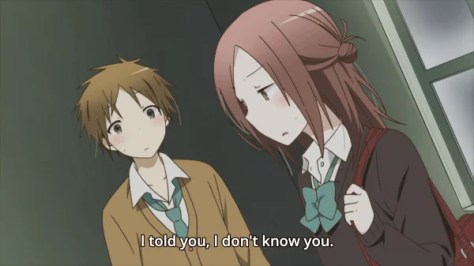One Week Friends and How To Remember Love
Is it possible to forget how to be a friend? Spend enough time in isolation, and it almost seems like it is. Even for those who aren’t hikkikomori, for some who have had lengthy bouts of loneliness—through a break-up, work circumstances, travel, depression, or just a desire to be alone—the art of being with others is something that has to be relearned. To remember that others see you when you go out with bed head and the stained hoodie. To not mumble to yourself out loud when you have a thought. To show up on time when you agree with your coworkers to go somewhere, and to tell them if you are going to be early, or late. To look people in the eye when you are speaking to them.
Perhaps more importantly, to have an open heart and not assume the natural, suspicious huddle of someone who always thinks that the world is out to hurt you. To not push people away, rejecting in anticipation of rejection.

I honestly don’t care that much about the male protagonists in One Week Friends. Yuuki is the standard male naif, perhaps even more innocent than usual (this is almost Kimi ni Todoke levels of guilelessness here), and while he’s the one seemingly learning the lessons, he’s not the one who faces the greatest struggle. His friend Kiryu briefly introduces some tension but is ultimately the faithful wingman, the best bro who will help him get the girl.
No, Kaori, the girl with memories of close friends only a week long, is the one I feel for. It’s a shame that the source material mainly uses her selective short term amnesia as a moe charm vehicle, bolstered by her perpetual blush and her soft features. So far in the anime the poignancy of her situation is not allowed to go too far down the subtext that it suggests, which is: for some people, friendship is hard, so hard that it takes a deliberate effort to not forget how it’s done.
The cruel irony is that sometimes it’s the ones we yearn to be closest to–not just potential romantic partners (as is the case here), but anyone who offers genuine vulnerability and emotional intimacy–that we treat with the most fear and confusion and hesitancy. It’s why, not very long ago, I had no trouble giving gifts to my friends–except for the one I had a crush on; why I have such a hard time opening up to my family whenever I am in trouble, and turn to isolation instead; why some phone conversations with certain people are the ones I most want to avoid.
Kaori’s plight reminds me of the desire to make life easier, just by convenient forgetting, or perhaps resetting is a better word: a constant wiping of the slate clean and reliving of the most fun part of friendship—its beginning. She has to write everything down in order to do otherwise, and when I wondered why she hadn’t thought to keep a diary and a reminder until Hase suggests it, it dawned on me: because, in a way, it is easier for her not to. She can sidestep the inevitable pain and confusion of young friendship and love. It is as close as life allows her to have a do-over. We have all wished to undo a mistake in our lives sometimes, to start a relationship over or to unsay those words.
And yet, as time passes, and she starts to record her fleeting memories, connections begin to form in her mind. That something is important about this chain of thoughts and time, reaching past the limits of her immediate memory. When she loses the diary, she feels the growing absence in her heart, even though she cannot name it until the end. To get those memories back—rain-stained and perhaps blurred over—is, by then, a gift. Because friendship, as hard as it is, is a gift, and it is sustained by the good and bad memories created by that relationship.

And so we were made. Isolation is a kind of forgetting, a kind of amnesia. Isolation does offer a kind of predictable safety, but the kind of person it creates is, as CS Lewis wrote,
If you want to make sure of keeping [your heart] intact you must give it to no one, not even an animal. Wrap it carefully round with hobbies and little luxuries; avoid all entanglements. Lock it up safe in the casket or coffin of your selfishness. But in that casket, safe, dark, motionless, airless, it will change. It will not be broken; it will become unbreakable, impenetrable, irredeemable.
Some of us have been there, in that airless room. But eventually, if we are not to shrivel inside, we have to remember, by writing on the tablets of our hearts, that the reward for loving others is to love itself.
Anyone who loves their brother and sister lives in the light, and there is nothing in them to make them stumble. But anyone who hates a brother or sister is in the darkness and walks around in the darkness. They do not know where they are going, because the darkness has blinded them. —1 John 2:9-11



